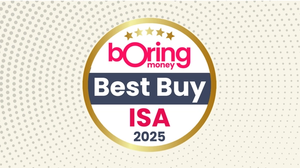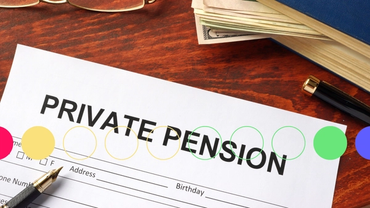ISA vs Pension: Which is best to save for retirement?
By Boring Money
17 Oct, 2025
When it comes to saving up for retirement, there are lots of different ways you can stash money away, but it can be a real pickle deciding which type of account is really the best one for you. Many of us are guilty of simply settling with a pension because that’s what everyone else does, forgetting that ISAs can also be a great vehicle for saving for your later years too. But which is the better way to save? And more importantly, which is best for you?

What's the difference between an ISA and a pension?
First things first: What’s the difference between a pension and an ISA? You’ll have heard both terms being thrown around in discussions about retirement, but let’s nail down the details before we start comparing the two.
What is an ISA?
ISA stands for ‘Individual Savings Account’ and is a type of savings account that you can use to put money into for the purpose of saving. There are several different types of ISA out there and there are also different ways that you can use the money while it’s sitting in your ISA. Let’s walk through this.
Types of ISA
There are 4 main types of ISA, but each one has slightly different features, so you may find that one suits your needs better than others. You can save up to a maximum of £20,000 in ISAs every tax year. This can be spread across more than one type of ISA, however, you can only save up to the £20,000 limit in total.
Let’s explain the main types of ISA on the market.
An account you can use to save money tax-free. As of the 2024-25 tax year, you can save up to £20,000 into a Cash ISA every tax year without paying a single penny of tax. You must be over the age of 18 to open one. Any interest earned on the money in a Cash ISA is free from Capital Gains Tax. You can read our full guide to Cash ISAs here.
Another account you can use to save money tax-free - but this time while investing! As of the 2024-25 tax year, you can save up to £20,000 into a Stocks & Shares ISA every tax year without paying a single penny of tax. You must be over the age of 18 to open one. Any gains (profits) or dividends earned from investments in a Stocks & Shares ISA are free from Capital Gains Tax. You can read our full guide to Stocks & Shares ISAs here.
An account you can use to save money either to purchase your first property or as part of your retirement fund. The UK government will give you a 25% cash bonus every 12 months! But as of 2024-25, you can only save up to £4,000 every year. You must be between 18-39 to open one, but you can keep paying in until you're 50. Read our full guide here for more on the rules, eligibility and pros and cons.
An account you can use to save money tax-free on behalf of a child. As of the 2024-25 tax year, you can save up to £9,000 into a JISA every 12 months without paying any tax at all. The child you are saving for can’t access the cash until they reach 18 years of age. Just like a standard ISA, the money can either be stored in cash or invested in stocks and shares. You can read more about Junior ISAs in our full guide here.
What is a pension?
A pension is a type of long-term savings account that you can use to put money away for when you’re retired. In most cases you can only access the money in a pension once you're over the age of 55 or you're retired - depending on the type. There are several different types of pension, and you can withdraw the money in different ways too, either: in a lump sum; “drawdown” in increments; or purchase an annuity to receive a regular income. Let’s take a look at the different kinds of pension.
Types of pension
There are 3 main types of pension, but each one is different, and you can have as many as you want – although you can only save the equivalent of 100% of your annual income or £60,000 per year tax-free (whichever is the lowest).
A State Pension is a regular income provided by the UK government which some people can access once they reach State Pension age. As of 2024-25, this is currently 66. Not everyone is eligible, and not everyone gets the same amount, as entitlement is based on your record of National Insurance contributions. You can read more about how the State Pension works in our full guide here.
A Workplace Pension is a pension scheme which is paid into by you and your employer. Contributions are typically taken directly from your monthly wages and your employer will boost this with a contribution of their own. Most people are automatically enrolled on a Workplace Pension. You can have either a Defined Contribution Pension (made up of your monthly contributions from your salary) or a Defined Benefit Pension (a predetermined sum agreed upon in your employment contract). Read more about how Workplace Pensions work and how you can use them in our guide here.
A Self-Invested Personal Pension (also called a SIPP or Private Pension) is a type of pension which you can set up in addition to other schemes to boost your retirement income. They’re similar to Workplace Pensions except you set them up yourself. You can pay in with regular contributions or make one-off payments whenever suits you, and you can access the money from the age of 55. Read more about how SIPPs work and how you can use them in our guide here.
ISA vs pension
Now that you’ve got a broad understanding of ISAs and pensions, let’s compare the two. Which is best for saving up for retirement? Are ISAs more tax-efficient? And what about inheritance when you pass away?
💵 Tax
When it comes to tax, ISAs are usually the more attractive option to save for retirement. That’s because the money in an ISA is completely tax-free, even at the point of withdrawal, whereas accessing a pension will incur a tax bill – although you can take 25% of your total savings without paying tax (known as the tax-free lump sum).
That being said, you can only save up to £20,000 per year into an ISA, while you can amass 100% of your annual earnings/£60,000 into a pension (whichever is lowest) over the same period of time, so if you’re able to tuck away more money then you might find a pension is better suited to you.
Alternatively, if you’re not able to save mountains of cash each year, a Lifetime ISA is a great way to save small amounts while benefitting from the 25% government top-up. If you start young, you could still save a great deal in a LISA, so get cracking!
But there’s no reason you can’t have both either - as long as you don't exceed your £20,000 annual ISA allowance in the process. If it’s within your means, it’s perfectly reasonable to boost your pension savings with an ISA of your choice, and your older self will probably thank you for it!
ISAs | Pensions | |
How much can I invest per year? | Up to £20,000 (£4,000 for LISAs) | Up to £60,000 |
How is it taxed? | Interest, gains and dividends are tax-free | Tax relief of 20-45% |
Additional feature | LISAs get 25% government top-up | Tax-free growth until you access (55+) |
💰 Fees
ISA and pension fees differ greatly depending on product and provider. If you go for a Cash ISA, you usually won’t have to pay any management fees, but a Stocks & Shares ISA will typically come with charges. These will be different depending on your provider and what exactly you’re investing in, but they’re usually calculated either as a percentage, such as 0.50%, or a monthly subscription, such as £10 per month.
In addition, some providers reduce the fee depending on the size of your account, so you may find that the charges reduce as the money in your pot increases.
As for pensions, Workplace Pensions and SIPPs often come with charges similar to Stocks & Shares ISAs. It really comes down to the individual provider though, so make sure you do your homework and find out exactly what you’re going to pay.
If you’re looking for the best ISAs and pensions with minimal fees, check out our Best Buy Low-Cost ISAs and Low-Cost SIPPs, where we’ve rounded up the providers offering the best accounts with low fees.
🍎🍐 Investment choice
In terms of choice of investments, it really depends on which provider you have. Workplace Pension schemes are typically quite limited and you’re more or less stuck with whatever you’ve been given.
Some employers will allow you to make changes though, so there's no harm in asking. But if not, remember you can always set up your own SIPP or open a Stocks & Shares ISA to have more control over what your money is invested in.
Many providers these days offer ready-made portfolios so you don’t have to do all the hard work. Or you can opt for a more granular approach and pick out specific funds or shares by yourself. Nowadays there’s plenty of choice for those looking to tailor their own portfolios, so whether you’re looking for high returns or sustainable choices, make sure you shop around to find the best provider and product for you.
This is a great opportunity to check out the winners of the Boring Money 2025 Best Buy awards! You can use them to compare the best providers on the market on everything from customer experience to beginner-friendliness.
🫱🏽🫲🏻 Inheritance
It used to be fairly common to move money from an ISA into a pension to reduce the value of your estate for Inheritance Tax (IHT) purposes. Currently, pensions are not included when calculating the size of your estate, whereas ISAs are. This means it can be smart to siphon funds into a pension if you're worried about your estate spilling over the threshold and landing your loved ones with a nasty 40% tax bill.
However, from 6 April 2027, pensions will be pulled into the IHT umbrella and no longer exempt. So this trick loses its shine. So unless the funds in your pension are actually spent or gifted, they’ll likely stay in the IHT net one way or another.
For those due to retire post-2027, deciding between an ISA and pension for your retirement savings is no longer as clear-cut. If you’ve already got a chunky pot (or you're on track for one) and want to keep HMRC’s share to a minimum, it’s worth getting professional advice before the rules change. An an adviser can assess your situation and lay out your options for reducing the IHT burden on your beneficiaries.
🫡 Accessibility
This one’s pretty straightforward: If you think you might need to access your cash before you retire (or reach 55), then an ISA is likely a better fit for you. You can even opt for an "easy access" ISA which gives you the freedom to dip into your funds whenever you like.
To be even more specific, if you’re only tucking away your money for a short period, then a Cash ISA is even better. But if you’re planning on sitting on your money for at least 5 years, investing in a Stocks & Shares ISA is usually the way to go, as you’ll able to benefit from the growth of the stock market and (hopefully!) ride out any short-term dips or troughs.
If history is anything to go by, you’re likely to be better off in 10 years’ time with a Stocks & Shares ISA than a Cash ISA. On the other hand, if you’re certain that you’ll be able to sit tight on your money all the way until your later years, then either a SIPP or a Lifetime ISA are both good choices – and they both accrue value the longer you leave them be, so it literally pays to be patient!
The reality is that if you think you can put away a decent amount each year, you can have the best of both worlds and opt for both a pension and an ISA of your choice at the same time. Two birds, one stone.
Which one is right for you?
As you’ve probably realised by now, it really depends on your unique personal circumstances whether an ISA or a pension is best for your retirement.
Crucially, if you think you might need to cash in on your savings at any point before retiring, then an ISA gives you the freedom to do so, but if you want to remove the temptation then a pension will keep your money tied up for longer.
So ultimately it comes down to personal priorities and preference. The table below summarises the key differences between the two if you're still not sure.
Feature | ISA | Pension |
Tax | Tax-free as long as you stay within the annual allowance. | Tax relief up to 45% on contributions plus 25% tax-free lump sum at point of withdrawal. |
Fees | Usually a flat fee (e.g. £10 a month) or a percentage of the amount in your account (e.g. 0.50% for £0 - £250,000). | SIPPs are generally more expensive under £100k and then similarly priced to ISAs above the £100k mark. |
Investment choice | Generally flexible with access to a wide range of products, such as shares, Investment Trusts and ETFs. | Workplace Pensions schemes are typically quite limited. SIPPs provide a wider range of choices like a Stocks & Shares ISA. |
Inheritance | ISAs count as part of your taxable estate. | From 6 April 2027, pensions will form part of your estate for IHT purposes. |
Accessibility | Typically easy to access whenever you need (usually within a few working days) with no exit fees. Lifetime ISAs charge a 25% fee if you withdraw inappropriately. | Minimum age you can access your funds is 55. Some providers charge an early access fee if you withdraw any funds before State Pension age (currently 66). |
Best Buy winners 2025
Whichever you choose, make sure you check out the winners of our Best Buy awards to see the ISA and pension providers that have won our seal of approval!






